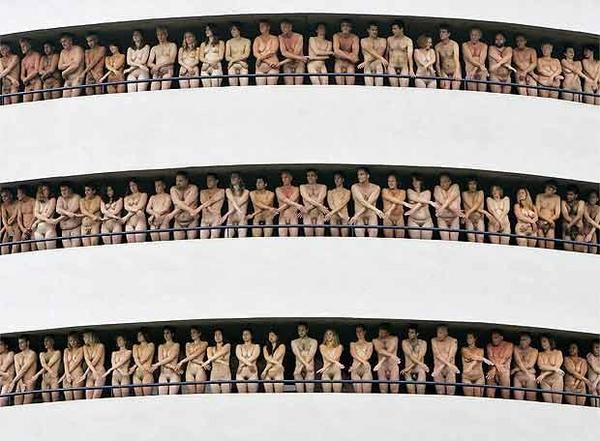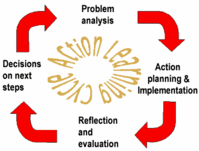| Tuesday, June 5, 2007 |
| Spencer Tunick |
 Spencer Tunick is this photographer who does nothing but arrange happenings where he takes pictures of large numbers of nude people in surprising public settings around the world. That certainly is something different. Nothing lewd about it, this is art. This one was Saturday in Amsterdam. [ Culture | 2007-06-05 00:12 | 5 comments | PermaLink ] More > |
| Action Learning |
 In a presentations about Boosting Collective Intelligence, George Pór and Martin Ludwigsen had a short segment where one would divide up into small groups and ask each other questions, in order to deepen one's understanding of a given question. Which was an excellent exercise. My group picked the question "How can I silence my ego to experience collective intelligence more often?" out of the three choices. So, instead of trying to answer it, one asks more questions. Like, we questioned whether one really needs to silence one's ego, or anything at all, in order for collective intelligence to happen. Which was a useful thing to look at, I think. And quite a productive thing to do for 5 minutes, compared with many other types of inquiry one could do. In a presentations about Boosting Collective Intelligence, George Pór and Martin Ludwigsen had a short segment where one would divide up into small groups and ask each other questions, in order to deepen one's understanding of a given question. Which was an excellent exercise. My group picked the question "How can I silence my ego to experience collective intelligence more often?" out of the three choices. So, instead of trying to answer it, one asks more questions. Like, we questioned whether one really needs to silence one's ego, or anything at all, in order for collective intelligence to happen. Which was a useful thing to look at, I think. And quite a productive thing to do for 5 minutes, compared with many other types of inquiry one could do.
They called it a simplified version of Action Learning, and since I couldn't remember what that is, I had to go and look it up. See Wikipedia, or look in Google, and you'll see that a lot has been said about Action Learning and Action Research. See here for a more clear introduction. Now, on one hand I think it is great that people have studied learning that is based on action, rather than on just theory, and on the other hand it seems a little bit ridiculous in a the-emperor-has-no-clothes kind of way that people have spent their life developing a model, and writing dozens and dozens of books about something that basically ads up to: - Go out and do something - Have a meeting and evaluate how well it went, and what you have learned, and what you can do better - Go out and do it some more, but hopefully better Don't get me wrong, that's a great approach. Particularly when one compares with traditional education which goes something like: - Listen for years to people who know better than you giving you a lot of theory - Spend the rest of your life doing what they told you to do, if you remember it The Action Learning idea is that there are alternating cycles of action and reflection. You do it, you reflect on it, and learn from it, and you go back to action. So, like this: action --> reflection --> action Or, you can make it sound more business-like and say it is: action --> review --> planning --> action One could say that this is very obvious, of course, but unless one makes something explicit, it might not happen. Companies and individuals and governments will happily keep doing the same thing forever, even if it isn't working, just because they never have a phase where they ask themselves whether it is working or not, and why and why not, and how one possibly could do it differently. A phase where one actually can reflect and inquire, and even question the basis of the whole thing. The feedback cycle is often missing, or real feedback is not allowed. Let alone real inquiry. It is kind of tragic that it is news that there is a type of learning that is directed towards being able to take action in the most effective way possible. I mean, that all learning isn't based on being able to do something. And kind of bizarre that people need to invent a whole new subject and write loads of books about it, in order to make the case for such an idea. But aside from that, I'm all for it. I'm sure there's much more to action learning, and any proper expert will be horrified by my casual treatment of the subject. I do believe in keeping simple things simple, and complex things too. And then again, maybe I'm jealous that it wasn't me who came up with a simple, obvious two-step process that I could write books about and lecture about for years. Oh, a few more meta observations... There's a lot of power in simply naming stuff, and in the way one frames it. So, simply saying that there are two phases of doing stuff, action and reflection - that automatically re-arranges the world, and sets up a quite different framework than if one hadn't mentioned it. Likewise, the simple hint that it is a series of cycles - that changes everything too. [ Organization | 2007-06-05 00:13 | 6 comments | PermaLink ] More > |